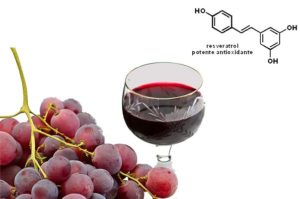
Non-melanoma skin cancer is the most common cancer among humans and solar UV radiation, particularly its UVB component (290-320 nm), is its major cause. One way to reduce the occurrence of the cancer is via the use of substances (often antioxidants) termed “photochemopreventive agents”. ‘Photochemoprotection’, which we define as ‘the use of agents capable of ameliorating the adverse effects of UVB on the skin’. Among many photochemoprotective agents, botanical antioxidants are showing promise. Because UV radiation is known to cause excessive generation of reactive oxygen species (ROS) thereby resulting in an oxidative stress condition. Approaches aimed at counteracting ROS production may be useful for the prevention of skin cancer. One approach to reduce its occurrence is through the eating of foods that have resveratrol in them. Resveratrol (trans-3,4′,5-trihydroxystilbene), a phytoalexin found in grapes, nuts, fruits, and red wine, is a potent antioxidant with strong anti-inflammatory and antiproliferative properties.
Resveratrol, a phytoalexin antioxidant found especially in red grapes, has been shown to have both chemo preventive and therapeutic effects against many diseases and disorders, including those of the skin. Studies have shown protective effects of resveratrol against ultraviolet radiation mediated oxidative stress and cutaneous damages including skin cancer. Because many of the skin conditions stem from ultraviolet radiation and oxidative stress, this antioxidant appears to have promise and prospects against a wide range of cutaneous disorders including skin aging and skin cancers.
One way we measure free radical stress in the body at Vitalia Health Care is by using the Oxidative Stress Test, which is a test using a sample of blood. The Oxidative Stress Test looks at your level of total antioxidant capacity (TAC) of your body, your glutathione levels and oxidized fats (oxLDL) which have been associated with cardiovascular disease, diabetes and cancer to name a few. If your oxidative stress in high this means that you need more antioxidant foods and/or supplements such as resveratrol or more green tea for example. Less oxidative stress and better antioxidant capacity can protect not only your skin but also your heart, vessels, liver, kidneys, lungs and brain, which in turn leads to better quality of life.
Interested in finding out your oxidative stress levels? Call us today for more information!
Ndiay, M. et al. The Grape Antioxidant Resveratrol for Skin Disorders: Promise, Prospects, and Challenges. Arch Biochem Biophys. 2011 Apr 15; 508(2): 164–170.
Afag, F. et al. Prevention of short-term ultraviolet B radiation-mediated damages by resveratrol in SKH-1 hairless mice. Toxicol Appl Pharmacol. 2003 Jan 1;186(1):28-37.
Aziz ME, et al. Prevention of ultraviolet-B radiation damage by resveratrol in mouse skin is mediated via modulation in survivin. Photochem Photobiol. 2005 Jan-Feb;81(1):25-31.
Reagan-shaw, S. et al. Resveratrol imparts photoprotection of normal cells and enhances the efficacy of radiation therapy in cancer cells. Photochem Photobiol. 2008 Mar-Apr;84(2):415-21.


